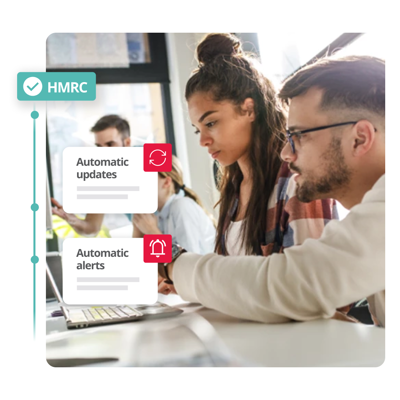What is RTI Payroll? (Real Time Information)

In this article, we cover the query, what is RTI payroll. You may have heard the term before but are perhaps unfamiliar with its origins, and how it can impact how you carry out payroll for your SMB.
So, we will address the basics, cover relevant terminology (including a real-time information definition) and share advice on how you can best comply. Don’t forget to explore our payroll software and payroll outsourcing pages if you’d like to explore your payroll options further.
What is RTI?
RTI stands for ‘Real Time Information.’ It is a system introduced by the UK government in 2013. Under this law, businesses must report payroll information to HMRC every time they pay their employees. Prior to PAYE RTI, submissions to HMRC were only required at the end of the financial year.
RTI ensures the reporting of payroll is more efficient and accurate, and that employees receive the correct amount of pay.

How to comply with RTI for payroll
When considering how to comply with RTI HMRC, you should consider the method you’re currently carrying it out. If using payroll software, then it is essential that you select a solution that is RTI compliant. Similarly, if you decide to outsource your payroll, your chosen bureau should also be RTI compliant. Deciding on managed in-house payroll vs payroll software will require close consideration.
While most providers are compliant with PAYE RTI, it is always good to check. This is particularly important if you’re considering an integrated HR and payroll software provider.
Whatever option you choose to ensure RTI compliance, the responsibility will always fall onto you – and not the payroll service. Therefore, you should take an active role in ensuring your payroll system is up-to-date and that it complies with necessary regulations. It’s also important that you are reporting payroll information in real-time, submitting FPSs and EPSs as necessary. This will ensure you remain compliant and avoid penalties from HMRC.

What happens if I don’t comply with RTI?
As mentioned before, non-compliance can equal penalties and fines. And regardless of the payroll solution you choose, it will still be your responsibility to ensure you are complying with RTI HMRC.
You will incur penalties if:
- Your FPS was late
- You did not send the expected number of FPSs
- You did not send an EPS when you didn’t pay any employees in a tax month
You won’t receive a penalty from the HMRC if:
- Your FPS is late but all reported payments on the FPS are within 3 days of payday
- You’re a new employer and you send your first FPS within 30 days of paying an employee
- It’s your first failure in the tax year
How much you pay:
- 1-9 employees: £100
- 10-49 employees: £200
- 50-249 employees: £300
- 250 or more: £400
Further information on making the correct RTI submission can be found on the GOV.UK website.

Payroll software that helps you stay compliant
To avoid stating the obvious, PAYE RTI is a crucial aspect of payroll management for all businesses in the UK. It requires companies to make an RTI submission (which are FPSs and EPSs) in real time. This ensures accuracy and compliance with regulations. Failure to comply will result in penalties and fines from HMRC.
There are a number of things an SMB can do to ensure compliance with RTI HMRC. Firstly, you may wish to consider a trustworthy payroll software provider that is RTI-compliant. However, payroll software isn’t for everyone, and you should closely evaluate your existing resources before making this decision. Read our article, 5 disadvantages of payroll software, for further information.
If you are interested in offloading the role of payroll entirely, then a payroll outsourcing bureau is another top consideration. This approach can free up your time, remove the risk of error and non-compliance, and importantly, ensures your staff get paid correctly and on time. If you are considering this route, read our article - The 5 common outsourced payroll integration problems (and how to avoid them).
For a side-by-side comparison of the two options, read our article - Managed In-House Payroll vs Outsourcing Payroll Services.

Thanks for taking the time to read today’s article. If you think Access PeopleHR might be a good fit for your company, then take advantage of a free trial.
You might be interested in:
We are trusted by experts

















































